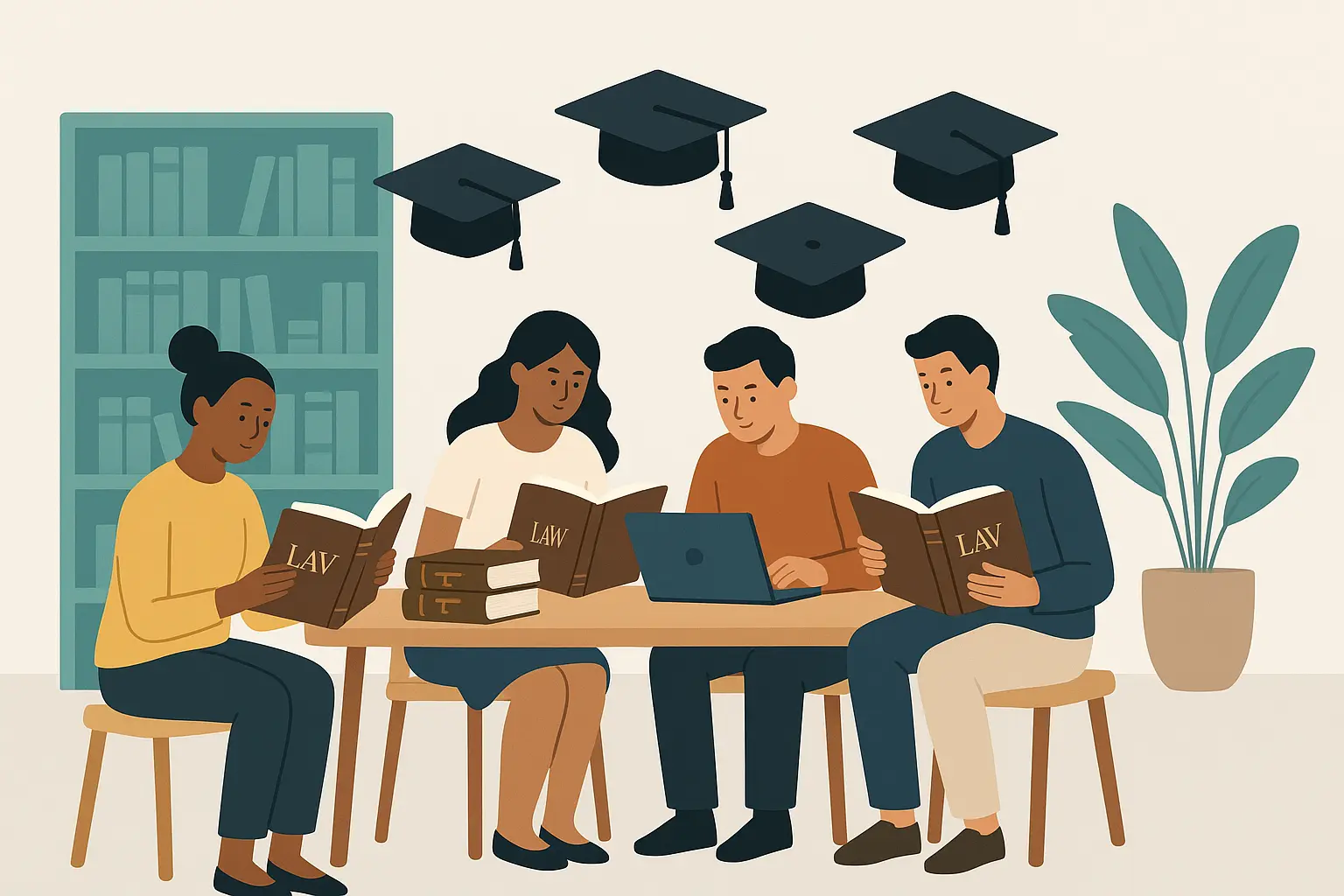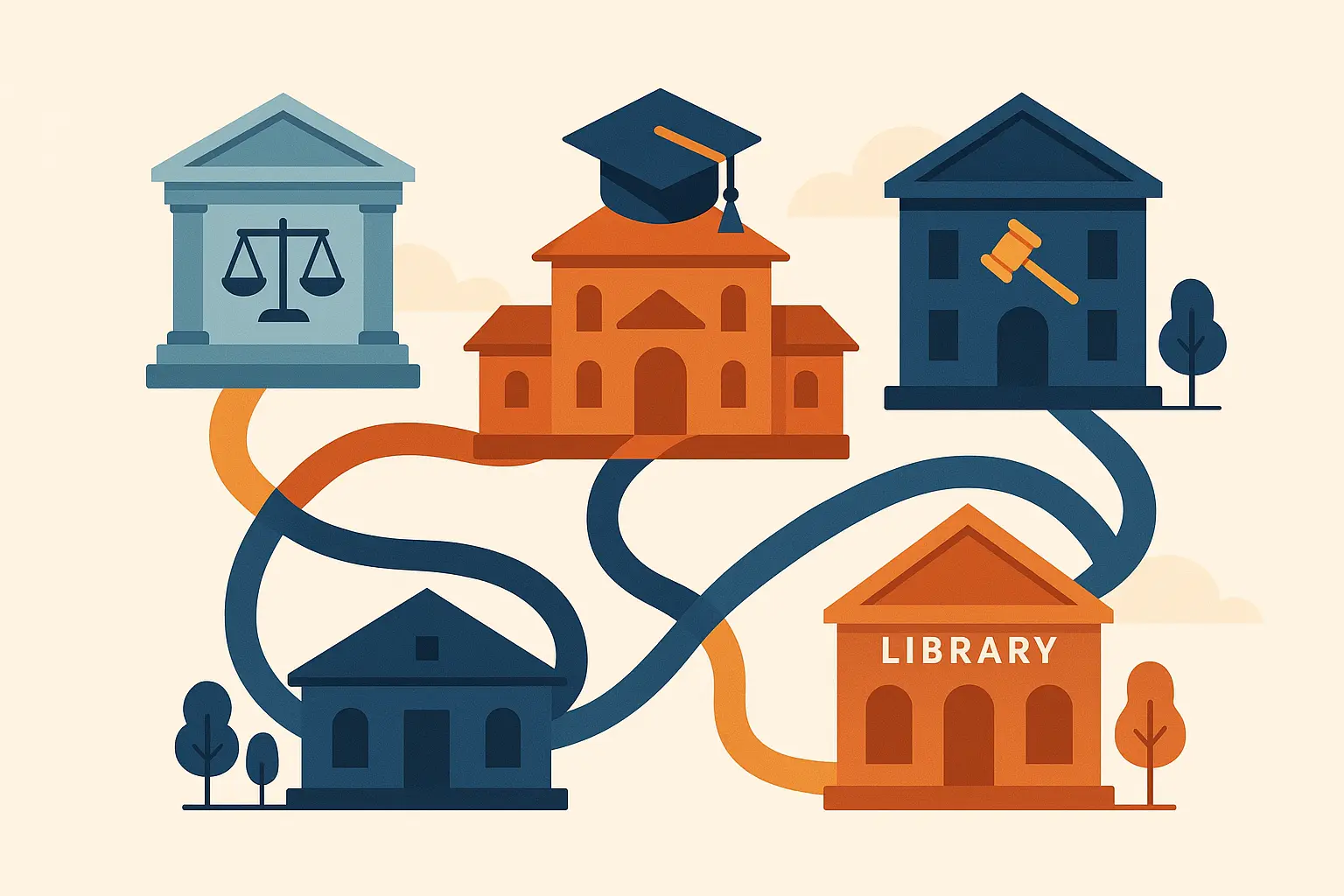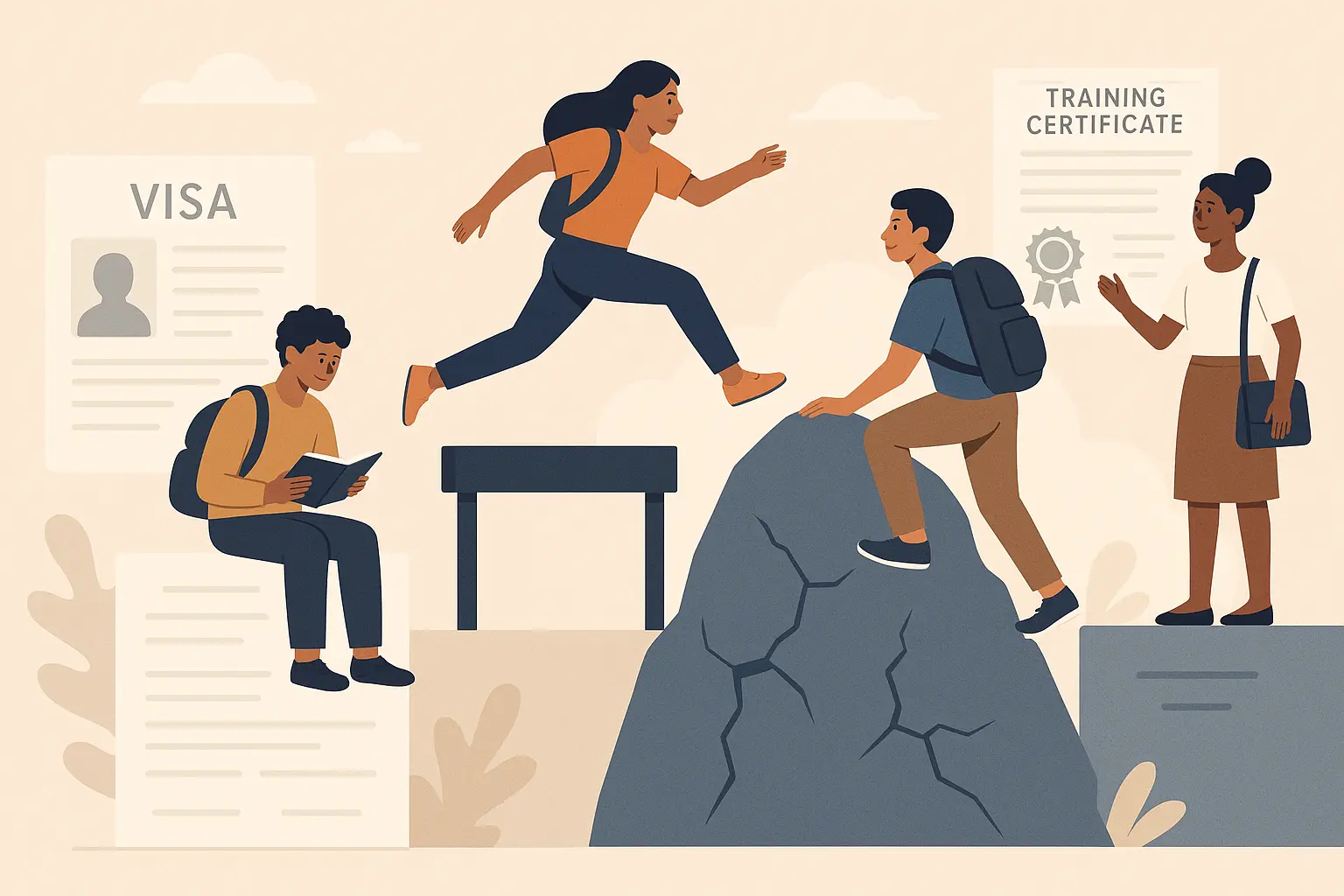Getting an LLB degree isn’t as straightforward as the typical “3-4 years” answer you’ll find everywhere. I found out the hard way that your timeline totally depends on a bunch of stuff nobody tells you about – like where you study, your academic pathway, professional requirements, and whatever life throws at you. This guide breaks down the real timeline variations you need to know before starting your legal education journey.
While “law school on its own typically takes three years to complete” according to Coursera, the reality is way messier when you consider the full educational pathway from start to actually practicing law. I spent months digging into these hidden factors, and what I found will probably surprise you.
Table of Contents
-
Location, Location, Location (And Why It Matters More Than You Think)
-
All the Academic Curveballs They Don’t Warn You About
-
The Stuff They Don’t Mention in the Brochures: Professional Training Requirements
-
How Technology is Actually Changing Law School Timelines
-
Let’s Talk About the Elephant in the Room: Money
-
When Life Happens: Personal Stuff That Messes With Your Timeline
-
The Real Talk Conclusion
TL;DR
-
LLB duration varies like crazy by country – from 3 years in the UK to 7+ years total in the US (including your bachelor’s degree)
-
Direct entry programs can fast-track things, while prerequisite courses nobody mentioned can add unexpected time
-
Professional training requirements and visa restrictions create hidden timeline extensions that’ll catch you off guard
-
Online and competency-based programs offer flexible completion options that can speed things up or slow them down
-
Money problems and scholarship requirements often force students into longer timelines than they planned
-
Life stuff like family obligations and health issues create totally personalized degree timelines
Location, Location, Location (And Why It Matters More Than You Think)
Here’s what blew my mind: where you study completely changes how long it takes to get a LLB degree. Commonwealth countries typically let you jump straight into 3-year programs right from high school, while the US makes you get a bachelor’s degree first, turning it into a 7-year marathon from high school graduation. European programs follow standardized 3-year structures, and Asian countries have these cool integrated 5-year options that combine everything.
Here’s what I found when I mapped out the global mess:
|
Region |
Program Structure |
Total Duration |
Entry Requirements |
|---|---|---|---|
|
Commonwealth (UK, Australia, Canada) |
Direct Entry LLB |
3-4 years |
High School Completion |
|
United States |
JD (Post-Graduate) |
7+ years |
Bachelor’s Degree + 3 years JD |
|
European Union |
Bologna Process LLB |
3 years |
Secondary Education Certificate |
|
Asia (India, Singapore) |
Integrated Programs |
5 years |
High School + Combined Structure |
|
Civil Law Countries |
Bachelor of Laws |
4-5 years |
Varies by jurisdiction |
Commonwealth vs. American Systems: Two Completely Different Worlds
The differences between Commonwealth and American legal education systems are honestly ridiculous. Commonwealth countries let you dive straight into 3-year LLB programs, while America makes you do a 4-year undergraduate degree first, basically doubling your time commitment.
This becomes super important when you’re figuring out how long does it take to get a law degree in different places, because the pathways are totally different between countries.
Fast-Track Options: Programs That Actually Cut Years Off Your Timeline
Some places let high school graduates jump directly into LLB programs, finishing legal education in just 3-4 years total. These programs often throw in accelerated summer courses and credit transfer opportunities that can shave months off your timeline.
In the UK, students can start a 3-year LLB program right after finishing A-levels at 18, potentially becoming qualified solicitors by 24. Compare that to the US system where the same student would need to slog through a 4-year bachelor’s degree first, then 3 years of law school, making them 25 before even taking the bar exam. That’s a whole extra year of your life (and a lot more debt).
The American Reality: Why Legal Education Takes Forever
The US system forces you to get a bachelor’s degree before law school admission, creating a minimum 7-year educational journey. Your undergrad major choice can actually impact law school admission and potentially mess with your overall timeline depending on how strategically you prep.
According to Coursera, the completion time for becoming a lawyer in the United States is “7 years (4 years for bachelor’s degree + 3 years for JD)”, making it one of the longest educational pathways to legal practice globally. Because apparently, becoming a lawyer wasn’t complicated enough already.
What is an LLB becomes confusing here because the American system doesn’t actually give out LLB degrees – they give JD (Juris Doctor) degrees instead, which does the same thing but requires that extra undergraduate foundation.
Regional Program Structures: How Different Countries Handle LLB Requirements
Every region structures LLB programs differently, with varying credit requirements, practical training components, and thesis obligations that can totally mess with your timeline. European programs follow standardized rules thanks to something called the Bologna Process, while Asian countries offer innovative integrated programs that combine multiple educational levels.
European Standardization: When Bureaucracy Actually Helps
Europe’s standardization efforts created consistent 3-year LLB programs with built-in mobility options. The European Credit Transfer System (ECTS) lets students collect credits across borders, which can actually affect your timeline if you want to study internationally.
I’ve got to admit, this standardization actually makes planning way easier – you know exactly what you’re getting into regardless of which EU country you pick.
Asian Innovation: Programs That Combine Everything
Countries like India, Singapore, and Hong Kong offer these unique 5-year integrated programs that smash undergraduate education and legal training together. These programs often build bar exam prep right into the curriculum, which streamlines your path to actually practicing law.
All the Academic Curveballs They Don’t Warn You About
Academic institutions have these sneaky requirements that can seriously mess with your LLB timeline. Missing foundational knowledge might force you into prerequisite courses nobody mentioned, while research requirements and dissertation components can add 6-18 months to your degree completion. Fun times.
Prerequisites Nobody Mentions: Foundation Courses That Add Time
Here’s something they don’t put in the admissions materials: missing foundational knowledge can add months or even a full year through mandatory prep courses. Legal English requirements go way beyond standard language tests, and international students often need constitutional foundations courses before they can even start the real LLB stuff.
Recent developments in Canadian legal education highlight these challenges. As noted in “How to Start Studying Law in Canada” from Canadian Lawyer Magazine, “studying law in Canada requires an understanding of the country’s legal education even before enrolling” due to provincial variations in requirements and bar admission processes. Because why make things simple?
Language Barriers: Legal English Requirements
Legal education needs specialized language skills that go way beyond standard English proficiency. Academic writing intensives and constitutional foundations courses are often mandatory for students who don’t meet specific legal English standards.
Picture this: an international student from China might score 7.0 on IELTS (meeting general university requirements) but still need to complete a 6-month Legal English Foundations course before starting their LLB. That’s adding significant time and cost to their timeline that nobody warned them about.
Students dealing with these surprises often wonder about how long does it take to get a bachelor degree when considering their total educational pathway, since prerequisite requirements can seriously extend overall completion times.
Research Components: The Thesis Timeline Wild Card
Thesis requirements, research projects, and capstone courses can extend your timeline by 6-18 months depending on what your school expects. The choice between research-heavy and coursework-intensive paths has huge time implications, with defense and revision cycles creating totally unpredictable completion dates.
Fun fact nobody mentions: your thesis advisor going on sabbatical can literally add a year to your degree. I’m not kidding.
Thesis vs. Coursework: Strategic Timeline Decisions
You can often choose between research-heavy thesis tracks or coursework-intensive completion paths. Research requirements and publication expectations can extend degree completion but give you valuable career advantages through original research experience.
Timeline Planning Reality Check:
-
Research your target school’s thesis requirements early (like, really early)
-
Find out if there are coursework-only alternatives
-
Plan your thesis topic selection 12-18 months in advance
-
Budget an extra semester for potential revision cycles (trust me on this)
-
Check if your supervisor will actually be around when you need them
The Stuff They Don’t Mention in the Brochures: Professional Training Requirements
Combining academic study with practical legal training creates timing nightmares that can extend your overall qualification timeline. Mandatory work experience, clinical programs, and bar admission courses have to be completed alongside or after your LLB, often creating scheduling bottlenecks that’ll make you want to scream.
Clinical Programs: Real-World Training That Doesn’t Follow Academic Schedules
Here’s something they don’t tell you: limited spots in legal clinics and externship programs create bottlenecks that can delay graduation. Court schedules affect clinical education timing (because courts don’t care about your academic calendar), while background checks for bar admission can create unexpected delays in professional qualification.
The bar exam prep situation is intense. According to Coursera, students should “aim to study 400 to 600 hours for the bar exam. This can take 10 to 16 40-hour weeks of studying.” That’s basically a full-time job on top of everything else.
Court Dependencies: When Real Legal Work Messes With Your Timeline
Clinical education components depend on actual legal proceedings, which totally ignore academic calendars. This creates unpredictable scheduling challenges that can push your graduation beyond your planned timeline.
I’ve talked to students who had their graduation delayed by a full semester because their required court case got postponed multiple times. The real world doesn’t care about your academic schedule, and that’s a hard lesson to learn.
International Student Challenges: Visa Rules That Limit Your Options
Immigration stuff seriously impacts LLB completion timelines for international students. Work authorization limitations can block access to required practical training opportunities, while specialized internship visa categories might have limited availability or take forever to process.
What is an LLB degree gets particularly messy for international students because different countries have varying recognition standards and additional qualification requirements for foreign-educated lawyers.
Work Authorization: How Visa Rules Mess With Practical Training
Visa restrictions on employment can limit international students’ access to practical training opportunities required for degree completion. Specialized internship visa categories for legal work might have limited availability, creating additional timeline headaches.
That moment when you realize your student visa doesn’t actually let you do the internship you need to graduate? Yeah, that’s a real thing that happens to people.
How Technology is Actually Changing Law School Timelines
Online learning, hybrid programs, and flexible scheduling options are creating new ways to get legal qualification with totally different timelines. Programs where you move ahead when you actually know the stuff (not just when the calendar says so) allow advancement based on mastery rather than time, while part-time and executive programs extend timelines but offer career flexibility.
The shift toward online legal education is picking up speed, though with some big limitations. According to “Law Schools Offering Online Law Degrees in Canada” from Canadian Lawyer Magazine, “law schools in Canada do not offer online law programs leading to an LLB or JD degree” due to the interactive nature of legal education, though law-adjacent programs are increasingly available online.
Online and Hybrid Innovation: New Ways to Complete Your LLB
Technology-enhanced legal education allows for accelerated or extended completion timelines based on your individual circumstances. Programs where you advance through mastery rather than seat time let students move through familiar material faster, while self-paced learning modules allow acceleration through stuff you already know.
Competency-Based Learning: Moving Ahead When You Actually Know the Stuff
Programs that let you advance based on demonstrated knowledge rather than time spent in class can potentially reduce degree completion time. Self-paced learning modules and assessment-only pathways offer options for experienced legal professionals to prove knowledge through examination rather than sitting through traditional coursework.
Sounds great in theory, right? The reality is a bit more complicated.
Flexible Programs: Extended Timelines for Working Professionals
Part-time and executive programs designed for working professionals might take 4-6 years to complete but offer way more career flexibility. Weekend and evening schedules, intensive block learning, and corporate sponsorship programs let you keep working while extending your overall program duration.
The flexibility comes with extended timelines. Pepperdine Law offers multiple completion options: “the traditional JD is completed over 3 years (6 terms). Pepperdine Law also offers two other options to students for completion of the program, an accelerated program that is completed in 24 months and an extended option that may be completed over 7 years of study.”
Plot twist: that “accelerated” program might actually take longer if you’re working part-time to pay for it.
Non-Traditional Scheduling: Making Legal Education Work Around Your Life
Weekend and evening schedules let working professionals pursue LLB degrees while keeping their jobs. Block learning intensives and corporate sponsorship programs create extended timelines but provide guaranteed career advancement opportunities.
For professionals considering flexible education options, understanding how long does it take to get a masters degree can give you valuable context for managing multiple educational commitments alongside career obligations.
Let’s Talk About the Elephant in the Room: Money
Let’s be real about money for a hot second. Funding constraints, scholarship requirements, and economic pressures create hidden extensions to LLB completion that standard academic calendars totally ignore. Merit maintenance requirements and work-study balance realities often force students to extend their timelines way beyond planned completion dates.
Scholarship Dependencies: How Funding Cycles Control Your Timeline
Funding cycles, renewable scholarship requirements, and financial aid processing seriously impact actual degree completion timelines. GPA requirements for continued funding can force students to reduce course loads, while summer funding gaps create forced breaks in degree progression.
|
Funding Source |
Timeline Impact |
Requirements |
Renewal Conditions |
|---|---|---|---|
|
Merit Scholarships |
May force reduced course loads |
High GPA maintenance |
Annual review, 3.5+ GPA |
|
Need-Based Aid |
Delayed processing extends start dates |
Financial documentation |
Annual FAFSA submission |
|
Employer Sponsorship |
Structured timeline with work obligations |
Employment commitment |
Performance reviews |
|
Government Loans |
Flexible but debt-conscious pacing |
Credit checks, enrollment verification |
Satisfactory academic progress |
|
International Funding |
Complex visa and transfer requirements |
Home country agreements |
Currency exchange considerations |
Merit Requirements: When Grades Determine Your Timeline
Merit scholarships sound amazing until you realize you need a 3.5 GPA to keep them. In law school. Where the curve is brutal. Merit maintenance requirements for scholarship renewal can force students into reduced course loads to maintain required GPAs. Academic probation implications create cascading effects on funding eligibility and degree progression, while summer funding gaps limit year-round study options.
Work-Study Balance: The Reality of Paying Your Way Through Law School
The need to work while studying affects course load capacity and degree completion speed. Part-time employment constraints influence course selection and progression through required sequences, though legal employment during studies can provide valuable practical experience.
Working 20 hours a week sounds doable until you’re trying to write a constitutional law paper at 2 AM after a double shift. That scholarship that covers tuition? Great. Too bad you still need to eat and pay rent.
Employment Constraints: How Working Affects Course Selection
The need to work while studying affects course selection and progression through required sequences. Legal employment during studies can provide practical experience advantages but may limit academic course availability due to scheduling conflicts.
Sarah’s story is pretty typical: she works 20 hours per week at a law firm while completing her LLB. This forces her to take evening classes only, extending her 3-year program to 4.5 years. However, her practical experience leads to a job offer upon graduation, demonstrating how extended timelines can actually be the best thing that happens to you.
Students balancing work and education often need to consider how long does it take to get a degree when planning their financial strategy, as extended timelines can significantly impact total educational costs.
When Life Happens: Personal Stuff That Messes With Your Timeline
Life circumstances, family obligations, and personal challenges create totally individualized timelines that are way beyond institutional control. Family and caregiving responsibilities, health considerations, and disability accommodations all require flexible degree progression patterns while ensuring educational accessibility.
Family Responsibilities: When Life Doesn’t Follow Academic Calendars
Eldercare, childcare, and family obligations create non-traditional degree progression patterns. Academic policies for parental leave can extend degree timelines while protecting academic standing, and limited on-campus childcare affects course scheduling and completion speed for parent students.
Pro tip: if you’re planning on kids during law school, add at least a semester to your timeline. Babies don’t care about your constitutional law final.
Parental Considerations: Balancing Family and Legal Education
Academic policies for family leave extend degree timelines while protecting academic standing. Childcare availability on campus seriously affects course scheduling options and completion speed for students with children, requiring careful timeline planning.
Family-Friendly Timeline Planning Reality Check:
-
Semester 1-2: Establish childcare arrangements and support networks (good luck finding affordable options)
-
Semester 3-4: Plan for potential family leave policies and academic accommodations
-
Semester 5-6: Coordinate clinical placements with family schedules (spoiler: they won’t match)
-
Final Year: Budget extra time for bar exam preparation around family obligations
Health and Accessibility: Accommodations That Affect Timeline
Medical conditions and disability accommodations can require extended timelines while ensuring educational accessibility. Mental health support systems address stress, anxiety, and mental health challenges that affect law school progression, with academic recovery programs helping students return to good standing after health-related difficulties.
Mental Health Reality: The Stress Factor Nobody Discusses
The mental health thing is real. Like, really real. Stress, anxiety, and mental health challenges seriously impact law school progression timelines. Academic recovery programs provide pathways for students to return to good standing after health-related academic difficulties, though these often extend overall completion timelines.
Law school is stressful enough without wondering if you’ll finish on time. Spoiler alert: most people don’t, and that’s actually normal.
Mental Health Timeline Considerations Reality Check:
-
Research campus counseling services before enrollment (you’ll probably need them)
-
Understand medical withdrawal and readmission policies
-
Identify academic accommodations available for mental health
-
Plan buffer time for stress-related academic delays
-
Connect with student support groups and peer networks (seriously, do this)
The Real Talk Conclusion
Here’s the bottom line: law school timelines are messier than anyone wants to admit. Your advisor will give you the official timeline, but life has other plans. Work happens. Family stuff comes up. Money gets tight. Mental health needs attention. Global pandemics shut down internship programs (thanks, 2020).
But here’s what I wish someone had told me: that’s all normal. The people who finish “on time” aren’t necessarily smarter or more organized – they’re just luckier. The rest of us figure it out as we go, and we still become lawyers.
The question “how long does it take to get a LLB degree” doesn’t have a simple answer because your timeline depends on dozens of interconnected factors. From geographic location and academic pathways to professional requirements and personal circumstances, every student’s journey is unique.
What I learned researching this topic is that successful legal education planning requires understanding these complexities upfront. Whether you’re looking at a 3-year Commonwealth program, a 5-year integrated Asian model, or the 7+ year American pathway, knowing the potential timeline variations helps you make informed decisions about your legal education investment.
So yeah, plan for the official timeline, but build in some buffer room for reality. And remember – whether it takes you 3 years or 5, you’re still going to end up with the same degree and the same opportunities. Sometimes the scenic route teaches you more anyway.
For those concerned about protecting their educational achievements throughout their career, understanding how to get a copy of your diploma becomes essential, especially given the significant time and financial investment required for legal education.
After investing years in earning your LLB degree, protecting this valuable credential becomes crucial. ValidGrad offers replica diploma services that provide peace of mind for legal professionals. Whether you need backup protection for your original documents or professional display copies for multiple offices, ValidGrad’s customizable templates reflect the specific formatting traditions of different legal education systems worldwide.
Many legal professionals also find value in securing replacement diplomas as a safeguard against loss or damage, ensuring their years of educational investment remain properly documented and displayable throughout their career.









